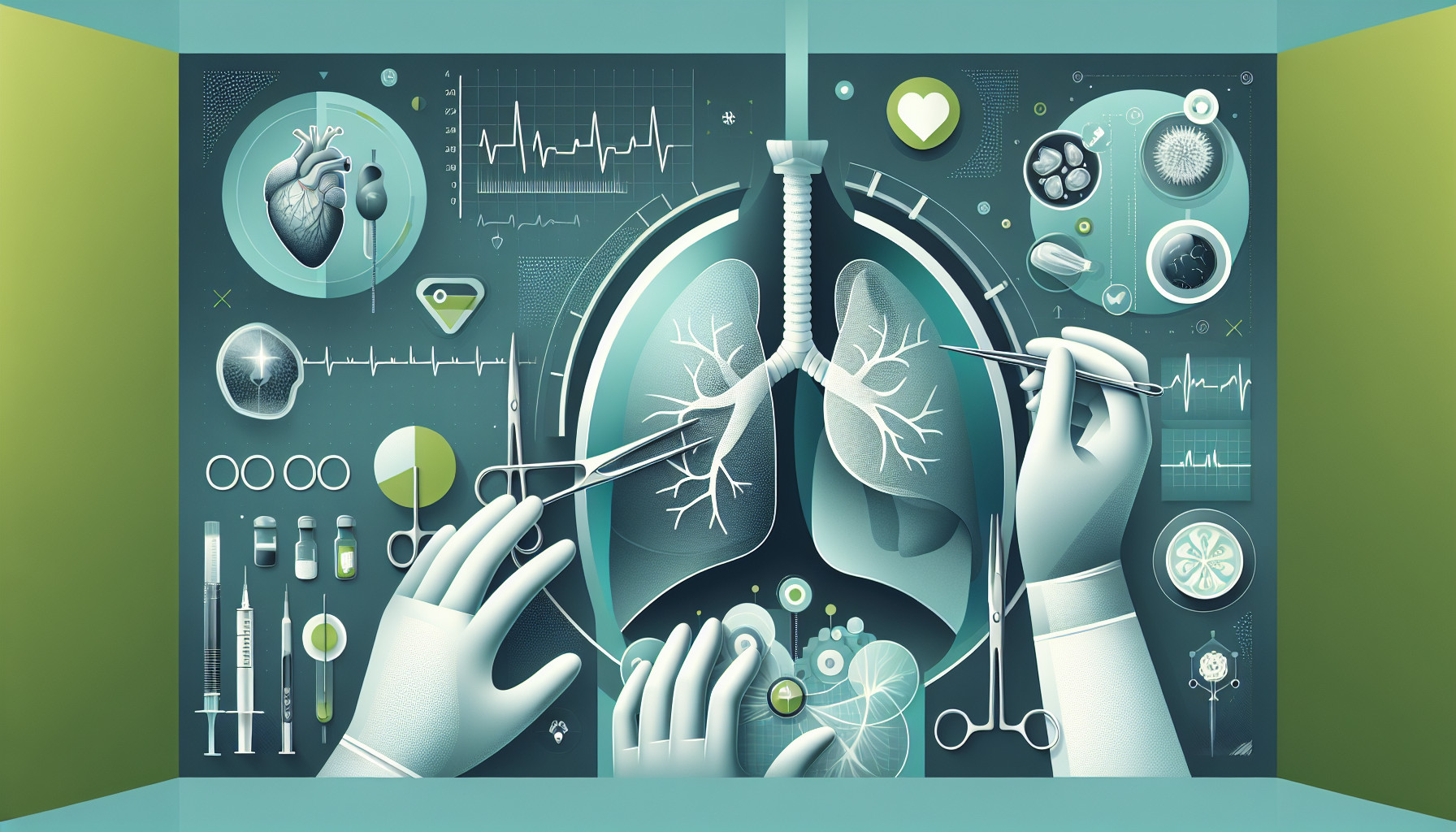Our Summary
This research paper discusses lung transplantation, a treatment option for severe lung disease that can enhance survival rates and improve the quality of life. It’s common for patients to be admitted to the intensive care unit (ICU) before their transplant for mechanical ventilation and extracorporeal membrane oxygenation (ECMO), which is a treatment that provides cardiac and respiratory support. The study highlights primary graft dysfunction as a significant immediate complication of lung transplantation that can lead to short- and long-term health problems and even death. Other reasons for ICU admission after transplantation include cellular rejection, unusual infections, and chronic lung allograft dysfunction. The paper also mentions that lung transplantation is increasingly being used to treat severe COVID-19-related acute respiratory distress syndrome (ARDS).
FAQs
- What is lung transplantation and when is it considered a therapeutic option?
- What are some of the common reasons for ICU admission before and after a lung transplant?
- Has lung transplantation become a common procedure for patients with COVID-19-related ARDS?
Doctor’s Tip
One helpful tip a doctor might tell a patient about lung transplant is to follow a strict medication regimen to prevent rejection of the new lung. It is important to take immunosuppressant medications as prescribed to reduce the risk of the body rejecting the transplanted lung. Missing doses or stopping medication without consulting with a healthcare provider can increase the risk of complications and rejection. It is also important to attend all follow-up appointments and communicate any changes in symptoms or health status to the transplant team. By following these guidelines, patients can increase the likelihood of a successful lung transplant and improved quality of life.
Suitable For
Patients who are typically recommended for lung transplant include those with end-stage lung disease, such as chronic obstructive pulmonary disease (COPD), idiopathic pulmonary fibrosis, cystic fibrosis, and pulmonary hypertension. These patients have severe symptoms, declining lung function, and reduced quality of life despite optimal medical management. Lung transplant may be considered when other treatment options have been exhausted and the patient’s life expectancy is limited.
Patients who are candidates for lung transplant undergo a thorough evaluation process to assess their overall health, lung function, and ability to tolerate surgery and post-transplant care. They must meet specific criteria set by transplant centers, including age, severity of illness, absence of significant comorbidities, and willingness to adhere to post-transplant medication and lifestyle requirements.
Patients with reversible conditions or those who are not medically stable enough to undergo transplant surgery may not be recommended for lung transplant. Additionally, patients with a history of noncompliance with medical treatment or substance abuse may not be considered suitable candidates for transplant.
Overall, lung transplant is recommended for patients with end-stage lung disease who have a good chance of benefiting from the procedure and who are able to comply with the necessary post-transplant care requirements. Each patient’s case is evaluated individually by a multidisciplinary team of transplant specialists to determine the appropriateness of transplant as a treatment option.
Timeline
Before lung transplant:
- Patient is evaluated by a lung transplant team to determine eligibility for transplantation
- Patient undergoes extensive medical and psychological evaluations
- Patient is placed on a waiting list for a suitable donor
- Patient may experience worsening symptoms and declining health while waiting for a transplant
- Patient may require admission to the intensive care unit (ICU) for bridge to transplant with mechanical ventilation and extracorporeal membrane oxygenation (ECMO)
After lung transplant:
- Patient undergoes surgery to receive a new lung(s)
- Patient is closely monitored in the ICU for immediate postoperative complications such as primary graft dysfunction
- Patient may experience complications such as acute cellular rejection, atypical infections, and chronic lung allograft dysfunction in the months and years following the transplant
- Patient may require readmission to the ICU for treatment of transplant-related respiratory failure
- Lung transplantation for COVID-19-related ARDS is becoming more common
- Patient undergoes regular follow-up appointments and monitoring to assess lung function and overall health post-transplant.
What to Ask Your Doctor
Am I a candidate for a lung transplant? What criteria do I need to meet in order to be considered for a lung transplant?
What is the expected survival rate and quality of life after a lung transplant?
What are the potential risks and complications associated with a lung transplant?
How long is the waiting period for a lung transplant? What factors determine how quickly a donor organ will become available for me?
What is the process of finding a suitable donor organ for a lung transplant?
What is the recovery process like after a lung transplant? How long will I need to stay in the hospital and what is the expected timeline for returning to normal activities?
What medications will I need to take after a lung transplant? What are the potential side effects of these medications?
How often will I need to follow up with my transplant team after the procedure?
What lifestyle changes will I need to make after a lung transplant in order to ensure the success of the procedure?
How will a lung transplant impact my ability to travel, work, and engage in physical activities?
Reference
Authors: Perez AA, Shah RJ. Journal: Clin Chest Med. 2022 Sep;43(3):457-470. doi: 10.1016/j.ccm.2022.04.007. PMID: 36116814
